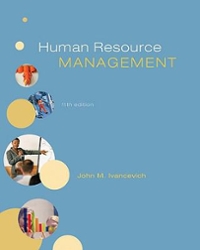The employer owned and managed an apartment building and townhouse complex, where it employed a number of
Question:
The employer owned and managed an apartment building and townhouse complex, where it employed a number of janitorial workers. On December 5, the union held an organizing meeting with these workers and obtained signed authorization cards from six of the employees in a proposed unit of 11 employees. One other employee in the unit was already a member of the union. On December 8, 1975, Orval Schimmel,* a union organizer, advised Thomas Hall, the employer's property manager, that the union represented recognition and bargaining rights. Hall responded that he had nothing to do with union matters and that the appropriate person with whom to speak was vice president Carl Alton.
On December 8, after the union had first requested recognition, a maintenance supervisor, Larry Melton, telephoned an employee, George Thompson, at his home and asked if any union people had contacted him. Thompson replied that none had. The next morning Melton entered the maintenance office, where the janitorial employees reported for work, and asked another employee, Alice Coleman, "What has the union done to you?" Coleman did not reply. Melton then entered his own office and called in a third employee, Theo Ewing. Melton told Ewing that he knew that the employees had brought in an organizer and wanted to organize a union. He then asked Ewing whether he had attended the meeting and whether he knew who sent for the organizer. When Ewing denied attending the meeting and any knowledge about who sent for the organizer, Melton repeated the questions and told Ewing not to sign anything or talk to any organizer and to keep him informed of any such activities. On the evening of December 9, Melton again telephoned George Thompson and asked whether he had spoken to any union people. Thompson admitted that he had but refused to offer any further information. Melton continued to question him about why he was doing this and who attended the meeting. After several unsuccessful attempts to elicit additional information, Melton said to Thompson, "You are either on my side of the fence or your side of the fence. . . . You always had it good. I have given you . . . you got a nice job, you got an apartment. . . . This is your last chance." Thompson still refused to answer.
That same evening, December 9, Melton telephoned Gloria Greer, another employee, and asked why she had not told him about the union meeting. Greer denied knowledge of the meeting. Melton then telephoned Ewing and asked who brought in the organizer. He repeatedly attempted to elicit this information, but Ewing said he did not know. Melton ended the conversation by telling Ewing to keep his ears and eyes open and to let him know if he heard anything. He also told him not to sign anything. On December 24, Larry Melton was terminated by the company, and he was replaced by Leo Nord. At about this same time, the company announced that it was improving its sickness and health benefits program for employees, including a new benefit to cover maternity medical expenses for employees and their spouses.
On January 30, the morning of the representational election, Leo Nord told Cecil Snow that if the union won the election, the employer would take the rent-free apartments away from the janitors' helpers and charge the head janitors for the second bedroom in their apartments.
On January 30, the union lost the representation election 6 to 4. The union filed numerous charges of unfair labor practices, claiming that these violations had dissipated the union's majority status as established by the authorization cards. These violations, in the union's view, were so serious and widespread that they made a fair rerun election unlikely.
The union requested that the company be ordered to recognize the union and bargain with the union on the basis of the prounion majority previously established by the signed authorization cards, which it had secured in early December 1975.
Questions
1. Evaluate the various claims made by the union and counterclaims made by the company regarding the charges of unfair labor practices. Which of the arguments are most persuasive?
2. Was the statement by Nord to Snow on the date of the representational election a threat or a legitimate prediction and personal opinion protected by the free speech provisions of the act?
3. Was the company obligated to accept the union’s majority status claim on the basis of the authorization cards submitted by the union?
4. If the company is found to have violated the act, what would be the appropriate remedy, a bargaining order or a new election?
Step by Step Answer:






